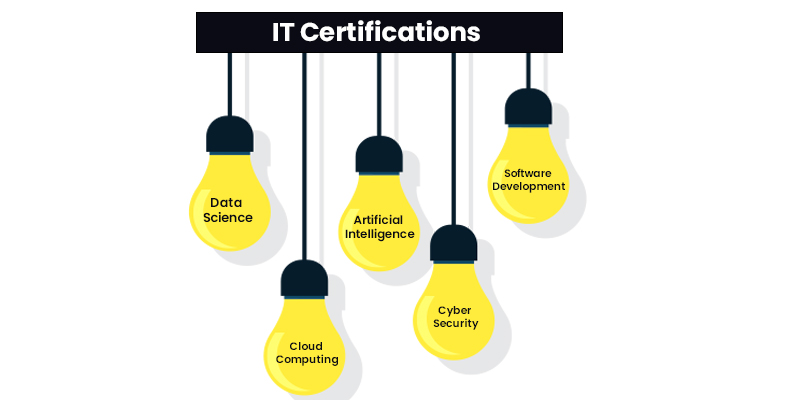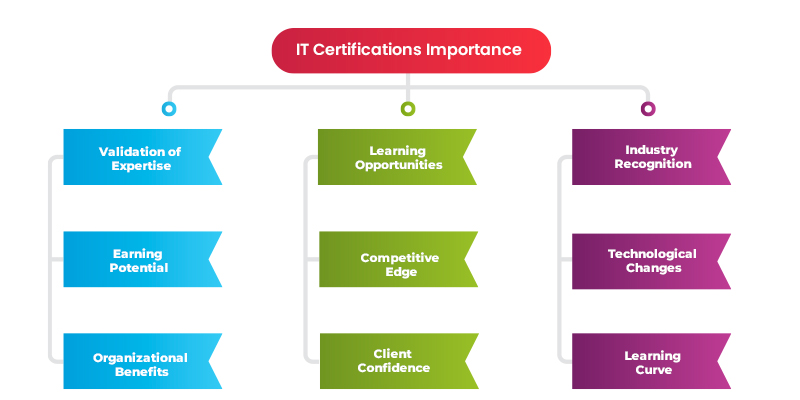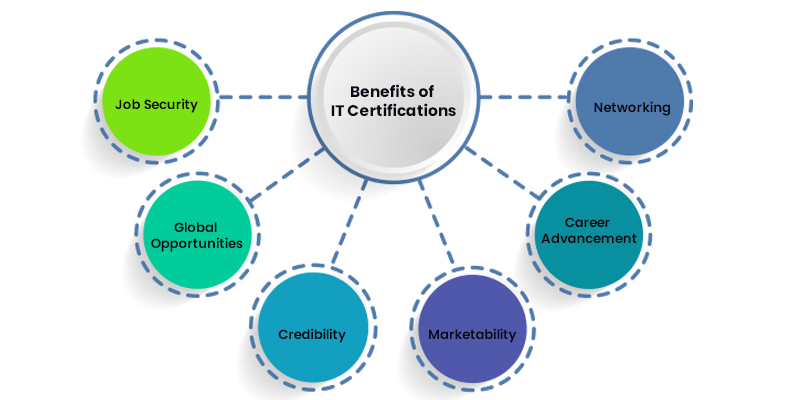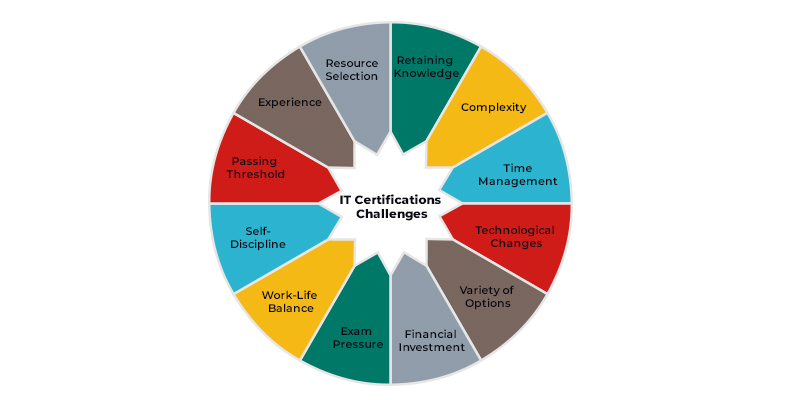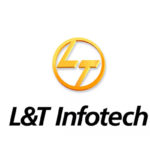In the field of Information Technology (IT), staying updated and showcasing your skills through certifications has become essential for both freshers jobs seeking candidates and experienced professionals. As a fresher entering into an IT career, choosing the right certifications can be a pivotal step toward establishing your expertise, gaining competitive knowledge, and opening doors to career advancement. In this blog, we will delve into what are the best it course certifications available for freshers, their importance, and their benefits.
What is an IT Certification?
IT Certification is generally referred to as a formal recognition provided by a reputable organization to an individual who has completed a certain level of expertise or proficiency in a specific skill, specialization, tool, technology or practice in the Information Technology (IT) field. These certifications are designed in a way that they determine the validation of an individual’s knowledge, capabilities, and competence in a particular specialization of the IT field.
Obtaining an IT certification involves passing a standardized exam or a series of exams that assess the candidate’s understanding of relevant concepts, practical skills, and problem-solving abilities. These exams are usually developed by industry experts and cover diverse topics related to the certification’s focus area.
Importance of IT Certification
It’s important to choose certifications that align with your career goals and the areas of IT that you are interested in. It course certifications can cover a wide range of topics, including networking, cybersecurity, programming, cloud computing, database management, project management, and more. Before pursuing a certification, research the requirements, exam details, and the credibility of the certifying organization to ensure that the certification will be valuable to your career path.
- Validation of Expertise: Certifications provide valid proof that individuals have the knowledge and skills necessary to excel in the given IT jobs in the industry . They validate your expertise to employers, colleagues, and clients.
- Learning Opportunities: Preparing for certification exams often involves comprehensive study, allowing you to deepen your understanding of the subject matter.
- Industry Recognition: Certain certifications are recognized and respected across the industry. Holding such certifications can help establish your credibility and reputation as a skilled professional.
- Higher Earning Potential: Many IT certifications are associated with higher earning potential. A candidate with a professional certificate is highly eligible for better compensation packages due to their specialized skills.
- Competitive Edge: In competitive job markets, certifications can give you an edge over candidates who lack formal validation of their skills. They showcase your commitment to continuous learning and professional development.
- Adaptation to Technological Changes: The IT landscape evolves rapidly. Certifications ensure that you stay current with emerging technologies and methodologies, helping you remain relevant in your field.
- Organizational Benefits: For employers, certified professionals contribute to higher-quality work and improved productivity. Certifications can also support you in standardizing practices within the organization.
- Client Confidence: Clients and customers often prefer working with certified professionals, as it assures them that they are dealing with knowledgeable experts who stay strong to industry’s best practices.
- Shortened Learning Curve: Certifications provide a structured path for acquiring skills related to a specific it qualifications. This approach can save your time and effort compared to learning independently.
Wipro offers diverse job vacancies for freshers. Candidates can click on Wipro Jobs For Freshers to apply for various job roles relevant to their skills and abilities.
Benefits of IT Certification
IT certifications offer a multitude of benefits to individuals looking to excel in the field of technology and make a significant impact in their careers. IT certifications offer a structured pathway to success in the ever-evolving technology landscape. They provide a clear roadmap for skill development and enable you to continuously enhance your expertise. As you consider pursuing certifications, you will have a lot of benefits to achieve your career aspirations and choose certifications that align with your goals and interests. Here are some key benefits of IT certifications:
- Job Security: Certified professionals are better equipped to handle complex tasks and challenges. This expertise enhances your job security, as organizations value employees who can deliver consistent results.
- Global Opportunities: Many IT certifications are recognized globally. This can be advantageous if you’re considering international job opportunities or remote work arrangements.
- Credibility: Earning certifications from recognized organizations adds credibility to your resume and can lead to increased trust from colleagues, clients, and employers.
- Marketability: Certifications can give you a competitive edge in a crowded job market by demonstrating that you are committed to professional advancement and staying current with industry trends.
- Career Advancement: It course certifications can enhance your career development by making you more attractive to employers and increasing your chances of landing job interviews or promotions.
- Networking: Certification programs that rely on Professional Networking often include access to professional communities, forums, and events, allowing you to connect and exchange ideas with experts who share similar interests and goals to stay informed about industry developments.
Challenges in Pursuing IT Certifications
Pursuing IT certifications comes with its own set of challenges despite the numerous benefits they offer. Understanding and preparing for these challenges will help you navigate the certification journey more effectively. Here are some common challenges you might encounter.
- Complexity of Material: IT certification exams often cover intricate technical concepts, tools, and technologies. Understanding and mastering these topics can be challenging, especially if they’re new to you.
- Time Management: Preparing for certification exams requires a significant time investment. Balancing study time with work, personal commitments, and other responsibilities can be challenging.
- Rapid Technological Changes: The IT industry evolves rapidly, and certifications need to keep up with the latest trends. Staying current with the most relevant and up-to-date material can be overwhelming.
- Variety of Options: The enormous number of certifications available can be overwhelming. Choosing the right certification that is relevant to your career goals can be a challenge.
- Financial Investment: Obtaining an it course certification involves costs such as exam fees, study materials, and possibly training courses. Handling the financial aspect can be challenging, especially for those on a tight budget.
- Exam Pressure: Certification exams can be rigorous and challenging. Tests can lead to mental anxiety, which can affect your performance, even if you’re well-prepared. Managing stress during the exam is very important.
- Work-Life Balance: Juggling a full-time job, family, and other commitments while preparing for exams can strain your work-life balance, leading to burnout if not managed effectively.
- Self-Discipline: Self-study is a significant part of certification preparation. Maintaining consistent study habits and staying motivated can be difficult without external structure.
- Passing Threshold: Some certifications require achieving a high passing score. This can add pressure and intensify the challenge of exam preparation.
- Experience Requirements: Certain certifications may need some prerequisites. Meeting these requirements can ensure your certification journey is completed on time.
- Resource Selection: Choosing the right study materials, practice exams, and training courses can be a challenge. Poor-quality resources can reduce your understanding and preparedness.
- Retaining Knowledge: Memorizing information solely for the exam without truly understanding the concepts can lead to knowledge loss shortly after the exam.
- Balancing Multiple Certifications: Some professionals pursue multiple it course certifications to broaden their skill set. Balancing preparation for different certifications can be time-consuming. Attempting to pursue multiple certifications simultaneously can lead to cognitive overload and reduced effectiveness in preparing for each exam.
If you are looking for job openings in Bangalore, you can look for job openings available in that city. Visit fresher job openings in Bangalore to look for job positions that are relevant to your skills.
Despite all these challenges, many individuals successfully earn IT certifications by approaching them with dedication, effective time management, and a clear plan. Addressing these challenges head-on, seeking support from study groups or online communities can help you overcome obstacles and achieve your certification goals. Remember that the rewards of enhanced career prospects, increased knowledge, and personal accomplishment are well worth the effort.
Best IT Certifications
- Data Science: Data science is an integrated field that involves the utilization of scientific methods, algorithms, processes, and systems to extract valuable insights and knowledge from structured and unstructured data. It combines elements of statistics, computer science, domain expertise, and data analysis to understand complex phenomena, make informed decisions, and predict future outcomes. Data science certifications are credentials that validate your skills and expertise in the field of data science. These certifications are offered by various organizations, educational institutions, and industry bodies to individuals who have demonstrated proficiency in key data science concepts, techniques, and tools. Earning a data science certification can enhance your credibility, increase your job prospects, and provide recognition for your expertise.
- Artificial Intelligence (AI): Artificial Intelligence (AI) referred to as creating a machine which can perform tasks that typically require human cognitive functions such as learning, reasoning, problem-solving, perception, understanding natural language, and interacting with the environment. Artificial Intelligence (AI) certifications are credentials that validate your skills and expertise in various aspects of Artificial Intelligence (AI), including machine learning, deep learning, natural language processing, computer vision, and more. Earning an AI certification demonstrates your proficiency in utilizing AI technologies, algorithms, and techniques to solve real-world problems and contribute to the development of AI-driven solutions.
- Software Development: Software development referred to as the process of designing, creating, testing, and maintaining computer software or applications. It involves a systematic approach to building software products that meet specific requirements, fulfill user needs, and provide solutions to various problems. Software development certifications are credentials that validate your skills and expertise in various aspects of software development. This it course certification demonstrates your proficiency in programming languages, development methodologies, tools, and practices. Earning a software development certification can enhance your credibility, increase your job prospects, and provide recognition for your technical skills.
- Cloud Computing: Cybersecurity, often referred to as information security which is a process of protecting computer systems and data from unauthorized access, attacks, damage, or theft. Cloud computing certifications validate your expertise in using cloud services and technologies, demonstrating your ability to design, deploy, manage, and secure cloud-based solutions. These certifications are valuable for IT professionals, developers, architects, and anyone working with cloud technologies.
- Cyber Security: Cybersecurity, often referred to as information security, which is the process of protecting the systems and data from unauthorized access, attacks, damage, or theft. It involves a set of strategies, technologies, processes, and practices designed to safeguard information and always ensure the confidentiality and availability of digital resources. Cybersecurity certifications are credentials that validate your expertise in various aspects of cybersecurity, including threat detection, prevention, risk management, and incident response. These certifications are valuable for individuals working in cybersecurity roles, such as security analysts, ethical hackers, penetration testers, and information security managers.
In conclusion, IT Certification serves as a stepping stone for launching your career successfully. As technology continues to shape industries and transform the way we work, IT certifications stand as powerful assets that improve your career development and open doors to a world of opportunities. So, in this blog, we discussed the best certification courses, their importance, benefits, and the challenges in pursuing them.



